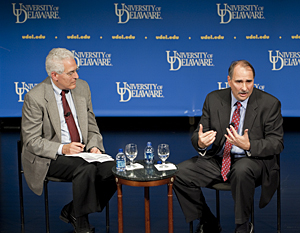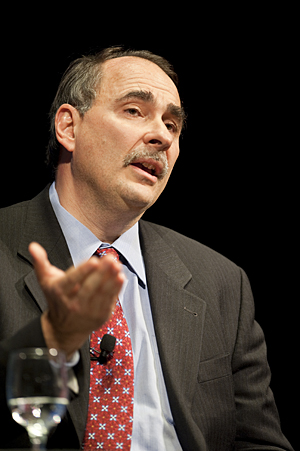

- Rozovsky wins prestigious NSF Early Career Award
- UD students meet alumni, experience 'closing bell' at NYSE
- Newark Police seek assistance in identifying suspects in robbery
- Rivlin says bipartisan budget action, stronger budget rules key to reversing debt
- Stink bugs shouldn't pose problem until late summer
- Gao to honor Placido Domingo in Washington performance
- Adopt-A-Highway project keeps Lewes road clean
- WVUD's Radiothon fundraiser runs April 1-10
- W.D. Snodgrass Symposium to honor Pulitzer winner
- New guide helps cancer patients manage symptoms
- UD in the News, March 25, 2011
- For the Record, March 25, 2011
- Public opinion expert discusses world views of U.S. in Global Agenda series
- Congressional delegation, dean laud Center for Community Research and Service program
- Center for Political Communication sets symposium on politics, entertainment
- Students work to raise funds, awareness of domestic violence
- Equestrian team wins regional championship in Western riding
- Markell, Harker stress importance of agriculture to Delaware's economy
- Carol A. Ammon MBA Case Competition winners announced
- Prof presents blood-clotting studies at Gordon Research Conference
- Sexual Assault Awareness Month events, programs announced
- Stay connected with Sea Grant, CEOE e-newsletter
- A message to UD regarding the tragedy in Japan
- More News >>
- March 31-May 14: REP stages Neil Simon's 'The Good Doctor'
- April 2: Newark plans annual 'wine and dine'
- April 5: Expert perspective on U.S. health care
- April 5: Comedian Ace Guillen to visit Scrounge
- April 6, May 4: School of Nursing sponsors research lecture series
- April 6-May 4: Confucius Institute presents Chinese Film Series on Wednesdays
- April 6: IPCC's Pachauri to discuss sustainable development in DENIN Dialogue Series
- April 7: 'WVUDstock' radiothon concert announced
- April 8: English Language Institute presents 'Arts in Translation'
- April 9: Green and Healthy Living Expo planned at The Bob
- April 9: Center for Political Communication to host Onion editor
- April 10: Alumni Easter Egg-stravaganza planned
- April 11: CDS session to focus on visual assistive technologies
- April 12: T.J. Stiles to speak at UDLA annual dinner
- April 15, 16: Annual UD push lawnmower tune-up scheduled
- April 15, 16: Master Players series presents iMusic 4, China Magpie
- April 15, 16: Delaware Symphony, UD chorus to perform Mahler work
- April 18: Former NFL Coach Bill Cowher featured in UD Speaks
- April 21-24: Sesame Street Live brings Elmo and friends to The Bob
- April 30: Save the date for Ag Day 2011 at UD
- April 30: Symposium to consider 'Frontiers at the Chemistry-Biology Interface'
- April 30-May 1: Relay for Life set at Delaware Field House
- May 4: Delaware Membrane Protein Symposium announced
- May 5: Northwestern University's Leon Keer to deliver Kerr lecture
- May 7: Women's volleyball team to host second annual Spring Fling
- Through May 3: SPPA announces speakers for 10th annual lecture series
- Through May 4: Global Agenda sees U.S. through others' eyes; World Bank president to speak
- Through May 4: 'Research on Race, Ethnicity, Culture' topic of series
- Through May 9: Black American Studies announces lecture series
- Through May 11: 'Challenges in Jewish Culture' lecture series announced
- Through May 11: Area Studies research featured in speaker series
- Through June 5: 'Andy Warhol: Behind the Camera' on view in Old College Gallery
- Through July 15: 'Bodyscapes' on view at Mechanical Hall Gallery
- More What's Happening >>
- UD calendar >>
- Middle States evaluation team on campus April 5
- Phipps named HR Liaison of the Quarter
- Senior wins iPad for participating in assessment study
- April 19: Procurement Services schedules information sessions
- UD Bookstore announces spring break hours
- HealthyU Wellness Program encourages employees to 'Step into Spring'
- April 8-29: Faculty roundtable series considers student engagement
- GRE is changing; learn more at April 15 info session
- April 30: UD Evening with Blue Rocks set for employees
- Morris Library to be open 24/7 during final exams
- More Campus FYI >>
3:09 p.m., Oct. 8, 2009----David Axelrod, senior adviser to President Barack Obama, reflected on the 2008 presidential campaign and discussed health care reform on Wednesday, Oct. 7, in front of a full house of students, faculty and community members at the University of Delaware's Mitchell Hall.
Axelrod's appearance was a part of the “Assessing Obama's First Year” lecture series, sponsored by the departments of Communication and Political Science and International Relations, the Office of the Provost, the College of Arts and Sciences, and the School of Urban Affairs and Public Policy.
A podcast of the presentation is available on the UD Podcast Web site.
Obama's path to the presidency
As Obama's chief strategist, Axelrod accompanied the president throughout his political campaigns and has known him for 19 years.
“Campaigns are wonderful in a sense that you get to travel the country, you get to meet people all the time and the spirit of that campaign was so invigorating and enjoyable. It was also very hard in the sense that we were under constant pressure for two years,” he said.
“Everybody rightfully points out that sometimes it's more profane than profound, and that there's a lot of nonsense associated with our presidential elections, but what it does do is test the person who is running for president and test their organization,” Axelrod said.
Axelrod said one of Obama's strengths is his ability to persevere while under pressure, alluding to two speeches he gave while on the campaign trail -- the first in Massachusetts in reaction to his defeat in the New Hampshire primary, and the other in Philadelphia in reaction to the conflict involving Rev. Jeremiah Wright. Axelrod said he was inspired and proud of Obama for being able to give such inspiring speeches that were able to move crowds.
“No matter how much confidence you have in someone you don't know, until you actually you see them under that kind of relentless pressure, how they'll handle it,” he said. “Little by little it became very, very clear that he had presidential qualities to him, because every time we were at our worst moments, he was at his best.”
Now that Obama and Axelrod are working in the White House, Axelrod said what stands out is the many meetings and the responsibilities that must be dealt with. A typical work day for Axelrod consists of arriving at the White House around 7:30 a.m. and getting home between 9 and 11 p.m.
“As the president said, nothing comes to him if it's easy. If it can be solved somewhere else, it doesn't come to him. He only gets the hard stuff,” Axelrod said. “The great thrill has been to watch him do the job, to sit there and watch him with such incisiveness and wisdom and work his way through some of these very, very difficult issues and doing it with the same sense of consistency, and calm and reason that we came to see during the campaign.”
Axelrod on health care
When asked about if he and Obama were surprised about how difficult it has been to overhaul the health care system so far, which was one of the highest priorities Obama listed during his campaign, Axelrod said he and the president have understood that it is a big challenge.
“The cacophony of interest groups, the emotions that are attached to health care, and the complexity of our system have conspired time and again to thwart efforts to reform the system,” he said. “One of the things (Obama) said when he ran for president, and one of the reasons he got elected president, is that we have a series of challenges and problems that have been around for decades. His commitment was to try and tackle these big problems because he believes that only by tackling these big problems, can we build the kind of foundation we need for a better future.”
Axelrod said he thinks action regarding the issue will be taken by the end of the year.
“I think there's a tremendous amount of momentum now, and I feel that we're on the doorstep of accomplishing something very important for the American people,” he said. “We've had a pretty protracted debate now. The committee of Congressmen have been talking about this since Congress convened in January. We've had full-throated national debate since May. I think people are ready for us to act and I think due diligence has been done.”
While industries have a lot of power, Axelrod said the public does have an influential role in how the country's health care situation will turn out.
“Obama said during the campaign that 'I want to bring all the stakeholders around the table' and that includes the pharmaceutical industry, the insurance industry, doctors, nurses and patients, because everyone ought to be part of the solution,” he said, noting that while various stakeholders have given more cooperation than others, the strongest support has come from doctors and nurses. “The truth is that we're closer today than we've ever been.”
Axelrod said the Obama administration plans to keep the best aspects of the current health care system, deal with the problems that exist, and strengthen the system for people who have insurance, as well as people who need insurance.
“Many people are very happy with what they have, and they ought to have the opportunity to keep that,” he said. “What we have sought to do is to create a reform that will give people who have insurance greater security, capping out of pocket expenses with their insurance companies, making sure that people with pre-existing conditions can get insurance, and making sure that if you get seriously ill, you're not dropped through this rescission, because you ought to be assured that when you need your insurance the most, that it will be there for you.
Axelrod added, “Then there are those who don't [have insurance], and right now they have to pay much more to get an insurance policy as an individual than they would if they got it through their employer, and that has priced many people out of the insurance market. We want to create an insurance exchange marketplace where people can go in and get insurance at a competitive rate. If people can't afford it, we'll help them with tax credits. In this way, we'll insure that the vast majority of Americans have coverage and anybody who wants it can get it.”
Axelrod also noted that there is a lot of partisanship on the issue, which continues to be a problem, but he said some prominent members of the Republican Party, including former Sen. Bob Dole, Gov. Arnold Schwarzenegger and Mayor Michael Bloomberg, have told Republicans to stop being reflexively against the health care plans that are being developed and urge them to think beyond politics.
Axelrod addressed concerns about the current health care system, noting that expenses and premiums have dramatically increased and more and more people are becoming underinsured, if not uninsured.
“My answer to those who are so critical is to step up and contribute their ideas and help work with us to solve the problem. Don't work to stop a solution to the problem, because that's not in the interest of the country,” he said.
The discussion was moderated by Ralph Begleiter, Edward F. and Elizabeth Goodman Rosenberg Professor of Communication and Distinguished Journalist in Residence at UD.
Article by Jon Bleiweis
Photos by Evan Krape


